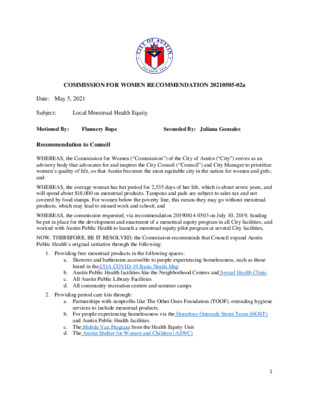20210505-02a: Local Menstrual Health Equity — original pdf
Recommendation

COMMISSION FOR WOMEN RECOMMENDATION 20210505-02a Date: May 5, 2021 Subject: Local Menstrual Health Equity Motioned By: Flannery Bope Seconded By: Juliana Gonzales Recommendation to Council WHEREAS, the Commission for Women (“Commission”) of the City of Austin (“City”) serves as an advisory body that advocates for and inspires the City Council (“Council”) and City Manager to prioritize women’s quality of life, so that Austin becomes the most equitable city in the nation for women and girls; and WHEREAS, the average woman has her period for 2,535 days of her life, which is about seven years, and will spend about $18,000 on menstrual products. Tampons and pads are subject to sales tax and not covered by food stamps. For women below the poverty line, this means they may go without menstrual products, which may lead to missed work and school; and WHEREAS, the commission requested, via recommendation 20190814-0303 on July 10, 2019, funding be put in place for the development and enactment of a menstrual equity program in all City facilities, and worked with Austin Public Health to launch a menstrual equity pilot program at several City facilities, NOW, THEREFORE, BE IT RESOLVED, the Commission recommends that Council expand Austin Public Health’s original initiative through the following: 1. Providing free menstrual products in the following spaces: a. Showers and bathrooms accessible to people experiencing homelessness, such as those listed in the COA COVID-19 Basic Needs Map b. Austin Public Health facilities like the Neighborhood Centers and Sexual Health Clinic. c. All Austin Public Library Facilities d. All community recreation centers and summer camps 2. Providing period care kits through: a. Partnerships with nonprofits like The Other Ones Foundation (TOOF), extending hygiene services to include menstrual products. b. For people experiencing homelessness via the Homeless Outreach Street Team (HOST) and Austin Public Health facilities. c. The Mobile Van Program from the Health Equity Unit d. The Austin Shelter for Women and Children (ASWC) 1 3. Providing educational programming and awareness: a. Developing materials (ex: brochures) about menstruation and menstrual disorders. b. Reference list of Obstetricians and Gynecologists that accept indigent clients in Austin/Travis County area. c. Austin Public Library grow its inventory re: materials about menstruation and menstrual disorders Date of Approval: May 5, 2021 Record of the vote: Unanimous on a 6-0 vote, with four commissioners absent, and one district vacant. Attest: Jonathan Babiak Jonathan Babiak, Staff Liaison 2